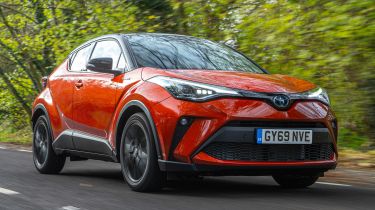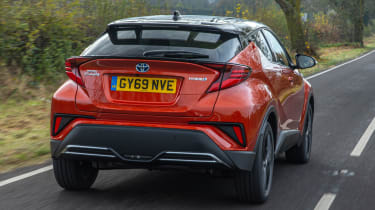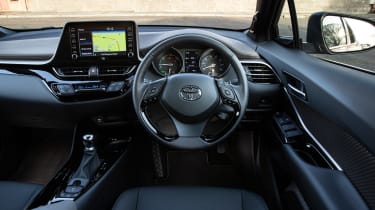Toyota C-HR Hybrid 2020 review
The updated Toyota C-HR SUV now comes exclusively as a hybrid, but has it been improved?

Available on all but the entry-level trim, this new 2.0-litre hybrid C-HR is worth the extra £1,640 over the 1.8, thanks to its better performance and on-road refinement. With relatively high prices, the C-HR is one of the more expensive SUVs in its class, but while rivals like the Skoda Karoq are better all-rounders, the C-HR offers almost unbeatable running costs. The hybrid-only drivetrain will be a desirable selling point for some buyers, too.
You don’t need us to tell you how popular SUVs are; one glance at the small crossover class will tell you that.
But the Toyota C-HR has always stood out on account of its daring design, smart cabin and accomplished driving dynamics. Now, three years on from launch, it’s been given a little makeover and, in contrast to its rivals, it comes solely as a hybrid.
With more than 400,000 sales to its name, the C-HR has been a hit for Toyota. Designed and engineered in Europe, it was built to tap into the insatiable demand for small SUVs, with 50,000 of those cars finding homes in Britain. While the Toyota RAV4 matured to become a more practical SUV, the C-HR – or ‘Coupé-High Rider’ – came in to seduce those buyers who were more interested in design than outright versatility.
Toyota hasn’t tinkered with the styling that much; there are new front and rear bumpers, two new alloy wheel designs, new lights and, if you’re an I-Spy fan, you’ll win 50 points for noticing the front foglamps have moved outwards in the bumper.
Used - available now

2024 Land Rover
Defender 110
1,226 milesAutomaticDiesel3.0L
Cash £67,960
2022 Skoda
Karoq
1,780 milesAutomaticPetrol1.5L
Cash £18,100
2020 Land Rover
Range Rover Evoque
30,000 milesManualDiesel2.0L
Cash £17,800
2023 Jaguar
I-PACE
35,954 milesAutomaticElectric
Cash £24,200But the big change is under the bonnet. Toyota says eight out of 10 UK buyers opted for a hybrid C-HR on the pre-facelift car, so the Japanese firm has decided to ditch the turbo petrol engine entirely. That means the 1.8-litre hybrid is the new entry-point into C-HR ownership. It now uses a lithium-ion battery that’s smaller and lighter than the nickel-metal hydride battery in the old C-HR – but crucially, it’s more powerful.
This 120bhp 1.8 is joined by the 2.0-litre hybrid from the Corolla. Called the 2.0 VVT-i, it uses two electric motors – one to harvest energy lost during braking, and another to power the car in full-EV mode. Total output stands at 182bhp and 202Nm of torque, while Toyota claims between 49.6 and 54.3mpg is possible. The 2.0-litre is around 10 per cent less efficient than the lower-powered hybrid.
For the most part, this new version impresses. That extra 62bhp over the 1.8 not only improves acceleration from a standstill – it’s 0.2 seconds quicker from 0-62mph – but with an extra 48Nm of torque, the 2.0-litre is also more responsive overall. Everyday performance is strong, with the C-HR slipping between petrol and electric power – seemingly more so than the 1.8. EV mode doesn’t just kick in at low speeds around town, either; on the motorway (at speeds of up to 75mph) the engine will frequently shut off, allowing you to glide along on electric power alone.
Ask the 2.0 VVT-i for everything it’s got, however, and the familiar foibles persist. Squeeze the throttle to its limit, and the CVT gearbox makes the engine rev coarsely – sending a rather dreary drone into the cabin. But it’s considerably less offensive than it is in the 1.8, thanks to its extra grunt.
Toyota has improved refinement. On the move the new C-HR is certainly quieter than the old car, while the ride and handling are a little more polished, too. New dampers have ironed out the ride and made the car a little more engaging; the steering remains sharp and well weighted, and the C-HR drives almost as sportily as its styling suggests.
The interior hasn’t escaped the minor facelift, either, since there’s a lightly revised infotainment system – with Apple CarPlay and Android Auto connectivity – as standard. This makes a big difference, because it allows owners to bypass Toyota’s otherwise- fiddly infotainment set-up, which is hindered further by the dated graphics and a poor layout. Thankfully, Toyota has also ditched the tacky digital clock for a more modern look.
But although the interior is well made and the C-HR feels like a high-quality product, space in the back seats is still a little short of the best in class. Plus rear visibility is limited due to that sloping roofline.
Get an alternative view on the Toyota C-HR from our sister site DrivingElectric










